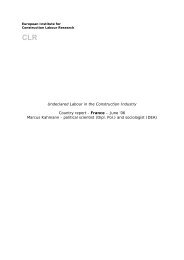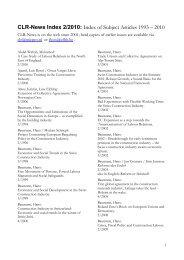Japan – what can we learn? - Construction Labour Research
Japan – what can we learn? - Construction Labour Research
Japan – what can we learn? - Construction Labour Research
You also want an ePaper? Increase the reach of your titles
YUMPU automatically turns print PDFs into web optimized ePapers that Google loves.
In fact, trade unions have been more involved with volunteer activitiesthan ever. Many leaders engage in volunteer activities (<strong>Research</strong>Institute for Advancement of Living Standards, 1997a). A dedicated"Citizens and Volunteer Bureau" has also been established at RENGO(JTUC) which, in coordination with similar departments of industrialunions, shows the development in organisational approaches tovolunteer activities. Efforts to expand and deepen <strong>Japan</strong>ese industrialdemocracy to make it more open have been initiated.The contemporary period is called the age of individualisation,differentiation, and diversification. The more these trends advance,ho<strong>we</strong>ver, coordination of diversified stakes to achieve socialintegration becomes more critical. In this context, too, realisation of amore open industrial society is a strategic challenge of importance.The new trade union movement should open its role to a civil society,overcoming the closed nature of enterprise unions. It is very muchanticipated that the trade unions exert their organizational po<strong>we</strong>r toenvisage a new social movement, as they have the largest organisingability and social influence among "non-profit organizations".Many workers expect labour unions to play meaningful social roles,and a substantial portion is ready to respond to a call to join a union.According to the survey results on “What workers want for <strong>Labour</strong>Unions” by RENGO-RIALS in 2003, more than 20 percent (21.6%)responded that labour unions are absolutely necessary while 49.7percent said that unions are some<strong>what</strong> necessary, i.e. more than 70percent believe that unions are necessary.Moreover, many workers hope that the presence of labour unions willhelp improve rights, working conditions, and the <strong>we</strong>lfare of workers.In terms of the benefits to society as a whole, they cite protection ofworkers’ rights (73.8%), improvement in working conditions (50.1%),more gender equity over employment opportunities (24.4%), andclosing the gaps in working conditions among different industries andcompanies (20.4%). Improvement in employee benefits, the <strong>we</strong>lfaresystem and the work environment (53.6%), inclusion of employeeopinions in corporate management (48.8%), reduction of unfairpersonnel evaluations (24.3%), curbing personnel reductions (23.1%),more gender equity over employment opportunities (20.9%) andmaintenance of corporate ethics (15.2%) <strong>we</strong>re noted as benefits forunionised workers.Clearly, many workers see labour unions as a necessity. They believeCLR News No 2/200663









